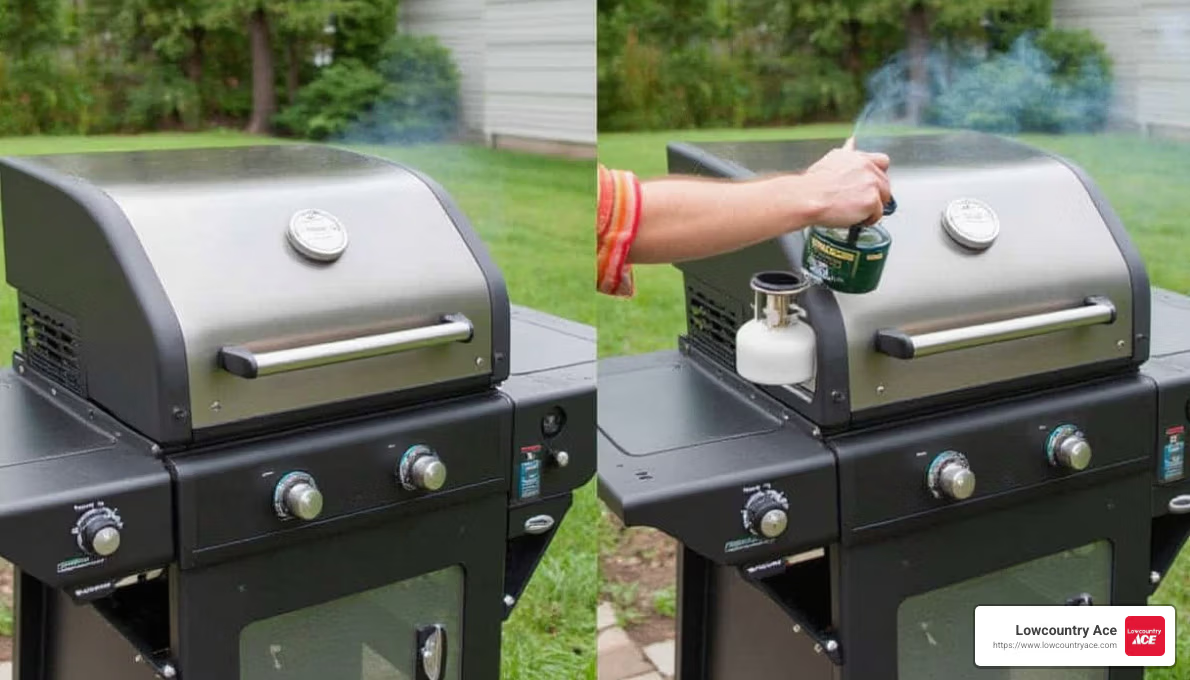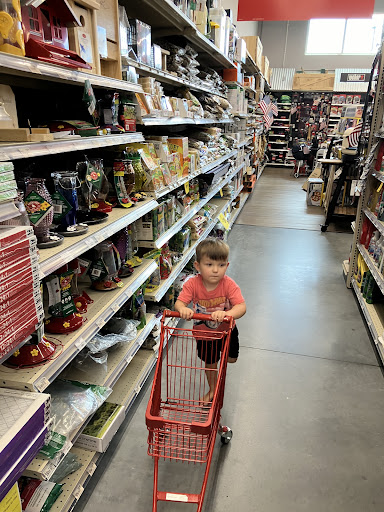Is It Cheaper to Refill Propane or Exchange? Top Pros
Is it cheaper to refill propane or exchange?
When considering propane tanks for grilling, understanding whether it’s more cost-effective to refill or exchange can greatly affect your budget. Here’s the straightforward answer:
- Refilling is generally more economical. On average, you can save up to $1.75 per gallon by choosing to refill instead of exchanging.
- Exchanging offers convenience. It provides a clean, inspected, and sealed tank ready for immediate use.
Grilling is a beloved activity around Charleston, with residents frequently gathering for barbecues. As expenses increase, finding ways to save becomes crucial without compromising the convenience and enjoyment of grilling.
The helpful team at Lowcountry Ace recognizes these needs. Situated in sunny and vibrant areas like James Island and Folly Beach, Lowcountry Ace is dedicated to assisting you in making informed decisions about grilling, propane costs, and more while embracing the coastal lifestyle. You’re in the right place for cost-effective solutions that cater to your outdoor cooking needs.
Is it cheaper to refill propane or exchange word roundup:
Is it Cheaper to Refill Propane or Exchange?
Understanding whether refilling or exchanging propane tanks is cheaper can make a big difference in your grilling expenses. Let’s break it down:
Cost Comparison
Refilling is typically more cost-effective than exchanging. Here’s why:
-
Lower Cost Per Gallon: By refilling, you generally save up to $1.75 per gallon. This is because you’re only paying for the propane you use, not for a new tank. This can add up to significant savings, especially if you use propane frequently.
-
Full Tank Guarantee: When you refill, you ensure your tank is filled to its maximum capacity. In contrast, exchanged tanks are often only 3/4 full, meaning you might not be getting as much propane as you think.
Exchange Costs
While exchanging propane tanks offers convenience, it comes at a price:
-
Higher Initial Costs: Exchanging a tank can be more expensive due to the added services of cleaning, inspecting, and sealing the tanks. You’re also paying for the handling and transportation involved.
-
Potential Propane Waste: When you exchange a tank, any propane left in your old tank is lost. This can lead to wasting propane you already paid for.
In summary, opting for refills can be a smart move for those looking to save money. However, if convenience is your top priority, exchanging might be worth the extra cost. The helpful team at Lowcountry Ace is here to guide you in making the best choice for your needs.
Pros and Cons of Refilling Propane Tanks
When considering whether to refill your propane tank, it’s important to weigh both the benefits and the drawbacks. Here’s a closer look:
Pros of Refilling
1. Cheaper Per Gallon
Refilling a propane tank is generally more economical than exchanging it. By choosing to refill, you can save up to $1.75 per gallon compared to the cost of an exchange. This is because refill stations charge only for the propane you actually need.
2. Pay Only for What You Use
With refills, you pay for the exact amount of propane you add to your tank. If there’s any propane left in your tank, you won’t lose it, unlike in exchanges where any remaining propane is forfeited. This means you get the most out of every gallon.
3. Full Tank Guarantee
Refilling ensures your tank is filled to its maximum capacity. Exchange tanks, on the other hand, are often only 3/4 full. This means you get more propane when you refill, ensuring you’re ready for all your grilling needs.
Cons of Refilling
1. Inconvenience
Refilling a propane tank can sometimes be less convenient. You need to find a specific location that offers refills, which might not be as readily available as exchange locations. Plus, these stations often operate only during regular business hours.
2. Fewer Locations
There are generally fewer refill stations compared to exchange locations like those at grocery stores or gas stations. This can make it more challenging to find a place to refill, especially in certain areas.
3. No Inspection
Refill stations typically do not inspect or recertify tanks for safety. Unlike exchange services where tanks are cleaned and leak-tested, refilling places the responsibility of tank safety on the owner. It’s important to regularly check your tank’s condition and expiration date to ensure safety.
Deciding between refilling and exchanging your propane tank involves considering these pros and cons. While refilling offers cost savings and ensures a full tank, it might require more effort to find a location and maintain your tank’s safety.
Pros and Cons of Exchanging Propane Tanks
When it comes to exchanging propane tanks, there are several factors to consider. Let’s explore both the advantages and drawbacks of this option.
Pros of Exchanging
1. Convenience
One of the biggest advantages of exchanging propane tanks is the convenience it offers. You can find exchange locations at many grocery stores, gas stations, and hardware stores. This means you can easily swap your empty tank for a full one while running other errands.
2. Quick Process
Exchanging a propane tank is a fast and straightforward process. Simply bring your empty tank to the exchange location, and in just a few minutes, you’ll have a full, ready-to-use tank. This is especially handy if you’re in a hurry or need propane urgently.
3. Inspected Tanks
When you exchange your tank, you can be assured that you’re getting a tank that has been cleaned, inspected, and leak-tested. This ensures safety and peace of mind, as you know the tank is in good condition and ready for use.
Cons of Exchanging
1. Higher Cost
Exchanging a propane tank is generally more expensive than refilling. According to research, the cost includes not just the propane but also the convenience and handling fees. This can add up, especially if you use propane frequently.
2. Partial Fills
Another downside is that exchange tanks are often not filled to their maximum capacity. Many exchange tanks are only about 3/4 full, which means you might be getting less propane than expected. This can lead to more frequent trips to exchange your tank.
3. Potential Propane Waste
When you exchange a tank, any leftover propane in your old tank is lost. This can be wasteful, especially if you didn’t use up all the propane. It’s important to time your exchanges to avoid wasting propane and money.
Understanding these pros and cons can help you decide if exchanging your propane tank is the right choice for you. While it offers convenience and safety checks, it might come at a higher cost and potential waste.
Frequently Asked Questions about Propane Tanks
Is it better to exchange or refill propane tanks?
Deciding whether to exchange or refill propane tanks often comes down to convenience vs cost. If you’re looking for a quick and easy option, exchanging might be your best bet. You can find exchange stations at many grocery stores, gas stations, and hardware stores. This makes it simple to swap your empty tank for a full one during your regular errands. Plus, exchanged tanks are typically inspected for safety, giving you peace of mind.
However, if you’re more focused on saving money, refilling is usually the cheaper option. When you refill, you only pay for the propane you actually need. This means you avoid the extra costs associated with pre-filled tanks. Refilling can save you up to $1.75 per gallon compared to exchanging. But remember, refilling requires a trip to a specialized refill station, which might not be as conveniently located.
How much does it cost to refill a 20 lb propane tank?
The cost to refill a 20 lb propane tank can vary based on several price factors. These include the size of the tank, the propane provider, and your location. Seasonal demand also plays a role; prices may rise during peak grilling seasons like summer. Generally, refilling is more economical than exchanging, as you only pay for the propane you use. It’s a good idea to call your local refill station for current pricing before you visit.
Are Blue Rhino tanks 15 or 20 pounds?
Blue Rhino tanks are often a topic of confusion when it comes to tank capacity. While they are marketed as 20 lb tanks, they are typically filled with only 15 pounds of propane during exchanges. This is due to safety regulations and the need to leave space for propane expansion. If you’re considering an exchange, keep in mind that you might not be getting a full 20 pounds of propane. Understanding these exchange details can help you make a more informed decision.
These FAQs highlight the key points to consider when deciding between exchanging and refilling propane tanks. Whether you prioritize cost savings or convenience, knowing these details can help you choose the best option for your needs.
Conclusion
At Lowcountry Ace, we’re all about making your life easier and more affordable. Whether you’re a grilling enthusiast or rely on propane for heating, we understand the importance of having a reliable and cost-effective propane solution.
Customer Service: Our team is here to help with all your propane needs. We pride ourselves on providing friendly, knowledgeable service that you can trust. Whether you’re refilling a propane tank or seeking advice on propane safety, our staff is ready to assist.
Local Convenience: Located in the heart of James Island, South Carolina, Lowcountry Ace is your local one-stop shop for propane services. We offer both refilling and exchange options to suit your preferences and budget. Plus, our convenient location means you don’t have to go far to get the propane you need.
Choosing between refilling and exchanging propane tanks often boils down to personal preference. If you’re asking, “is it cheaper to refill propane or exchange?”, the answer is usually refilling. But for those who value convenience, exchanging can be the way to go. Whatever your choice, we’re here to support you.
Visit our propane exchange service page to explore more about our services and how we can help you. Let us be your trusted partner in keeping your propane needs hassle-free!
Lowcountry Ace Hardware: Your one-stop shop for home improvement. We offer quality products from trusted brands and expert advice from our experienced staff. Located on James Island, visit us for tools, hardware, fishing gear, power tools, building materials, grills & smokers, electrical and plumbing supplies, and more.
















